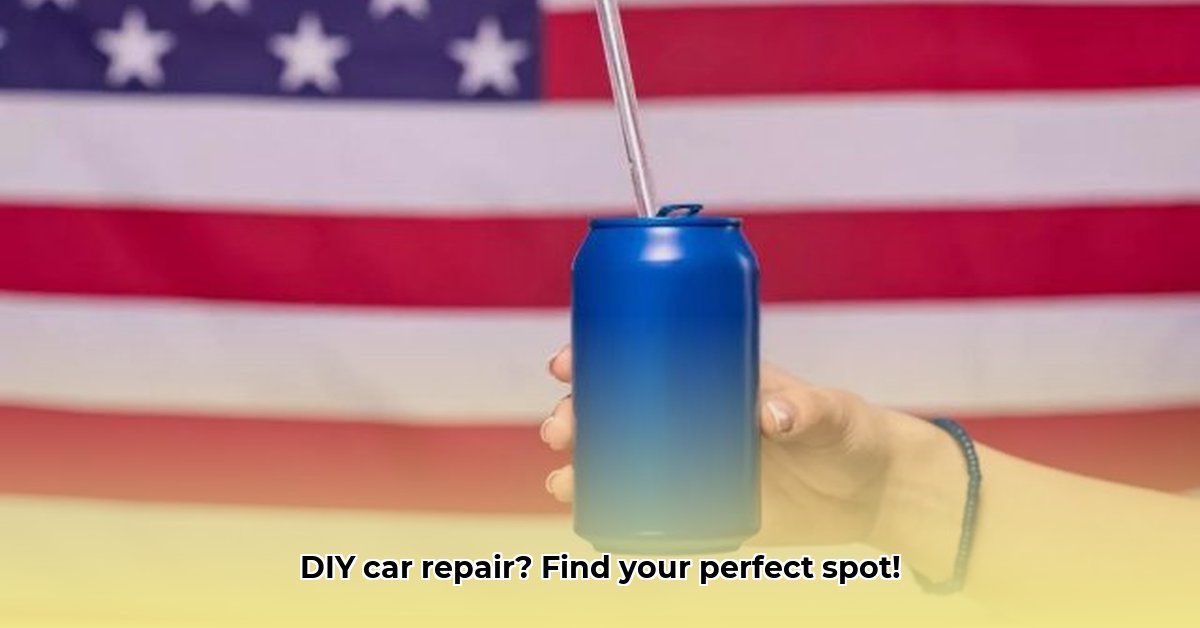Ready to fix your car yourself but not sure where to start? Finding the right spot to work on your car can be tricky. This guide will show you the best places to do it, from your driveway to a rented garage, explaining the pros and cons of each. We’ll cover safety, legal stuff, and everything you need to know for a smooth, successful repair – whether it’s a simple oil change or a bigger job. Let’s get you fixing that car!
Where Can I Work on My Car? Finding the Perfect Auto Repair Spot
So, you’re ready to tackle that car repair yourself – great! But where’s the best place to do it? Finding the right spot is key, not just for getting the job done but also for staying safe and out of trouble with the law. Let’s explore your choices and discover the ideal DIY repair location.
Your Own Space: The Perfect Pit Stop for Car Maintenance
Ideally, you’d work on your car in your own driveway or garage. It’s the safest, handiest, and completely legal option. You’re in charge, you can set your own pace, and everything you need – tools, parts, the whole shebang – is right there. Plus, you know the history of the space and its limitations. But what if you don’t have that luxury? Don’t worry, we’ve got options. This is the most convenient car repair location, but not everyone has access.
Public Places: A Risky Road for Vehicle Repairs
Think twice before working on your car on a public street, in a parking lot, or down an alley. Legally, it’s often a fuzzy area – you could easily face fines, or even worse, have your car towed. Many municipalities have ordinances specifically against working on vehicles in public spaces. And safety? Forget about it. You’re dealing with traffic, pedestrians, and the unpredictable elements. Plus, you’re exposed to the weather and potential theft. It’s simply not worth the risk. Working in public spaces presents legal risks for DIY car repair that are best avoided.
Smart Alternatives: Finding Your Repair Haven for Automotive Work
If you don’t have your own space, there are some great alternatives. One popular choice is renting a garage or workshop. Many cities have DIY garages or shared workspaces available; you often get access to specialized tools like lifts and diagnostic equipment, as well as good lighting, making everything safer and easier. Costs vary, naturally, but the peace of mind it offers is priceless. Check out local listings, online classifieds, and even community forums – you might be surprised what you find. Gearhead Workspace is one example of a company offering this service. Renting a space provides a safe and legal car repair environment, often with added benefits like tools and lighting.
Another great idea? Ask a friend! If you know someone who’s handy with cars and has some extra space, gently ask if you could use their driveway or garage. It’s a budget-friendly option, but always get their permission first, and treat their property with respect. Clean up after yourself, offer to help with other tasks, and be mindful of their time and space. Remember, it’s their kindness you’re relying on. Utilizing a friend’s garage for car repair offers a cost-effective solution when you lack your own space.
Less-Than-Ideal Spots: Proceed with Extreme Caution
There are some places you might consider, but they come with significant risks. Working in a storage unit, for example, is often a bad idea. Lighting and ventilation are usually terrible, and you’re cramped for space. Plus, it might even be against the rules of the storage facility. Outdoor locations like undeveloped areas or the woods are equally problematic. Besides the weather challenges, you risk damaging the environment and it’s almost guaranteed to be illegal in most areas. Before attempting any repairs in these spots, do your homework. It’s crucial to know the local regulations. These locations represent high-risk DIY car repair environments and should be approached with extreme caution due to safety and legal concerns.
Safety First: Your Top Priority for DIY Auto Work
Wherever you choose to work, remember – safety comes first. Seriously.
- Bright Lights: Make sure you have plenty of good lighting. Use work lights, drop lights, or even a headlamp to illuminate your work area. You don’t want to trip over tools or make a mistake in poor light.
- Jack Stands – Always! Never, ever trust a jack alone. Use jack stands for support. Place them on a level, solid surface. This is non-negotiable.
- Protect Yourself: Wear gloves and safety glasses. Use mechanics gloves to protect your hands from cuts and chemicals, and wear safety glasses to shield your eyes from flying debris.
- Fire Safety: Keep a fire extinguisher handy. Make sure it’s a Class ABC extinguisher, suitable for flammable liquids. You never know when it might be needed.
- Be Green: Dispose of fluids responsibly, like oil and antifreeze. Take them to a recycling center or auto parts store. The environment will thank you.
- First Aid: Have a well-stocked first-aid kit nearby for minor injuries.
- Ventilation: If you’re working indoors, make sure you have proper ventilation to avoid breathing in harmful fumes.
Prioritizing safety measures for DIY car repair is crucial to prevent accidents and injuries.
Knowing the Rules: Legal Considerations for Auto Maintenance
Before you even start, check your local laws and ordinances. Look up your city or county’s regulations online or contact your local government. What’s acceptable in one town could get you into trouble in another. Some areas have restrictions on noise levels, hours of operation, or even the types of repairs you can perform. Ignoring regulations can mean hefty fines, so get informed. Researching local regulations for car repair helps avoid potential fines and legal issues.
Choosing Your Workspace: Making the Right Call
Here’s a quick rundown of the pros and cons to help you decide. Weigh the factors carefully.
| Location | Pros | Cons |
|---|---|---|
| Private Garage/Driveway | Safe, easy, legal, complete control, convenient | Requires access to a garage/driveway; not everyone has this option. |
| Rented Garage/Space | Safe, well-equipped, usually legal, access to tools and equipment | Can be costly; may need reservations. |
| Friend’s Garage/Driveway | Budget-friendly, often convenient | Requires permission; availability may be limited, potential for strained relationships if not respectful. |
| Public Spaces (Street, etc.) | Convenient (if legal) | Often illegal; extremely unsafe due to traffic and other hazards, exposure to weather and theft. |
| Storage Unit | Potentially more private than public spaces; some protection from elements | Typically poorly lit, lacks ventilation, usually illegal, and unsafe, cramped. |
| Woods/Natural Area | Quiet and private (usually) | Extremely unsafe, high risk of legal issues, and potentially harms the environment, difficult to access, no electricity or water. |
Remember, choosing your workspace is about balancing convenience, affordability, safety, and legal compliance. Above all, prioritize safety. Do your research, understand the risks, and make a smart choice.
How to Legally Rent Affordable Space for DIY Car Repair: Finding Cheap Car Repair Options
Key Takeaways:
- Finding affordable, legal space for DIY car repairs can be challenging but achievable.
- Online platforms offer various rental options, from hourly to monthly rates.
- Thoroughly researching and understanding local regulations is crucial.
- Safety and liability are paramount; renters should prioritize safe workspaces and appropriate insurance.
- Negotiating rental agreements and clarifying expectations with landlords is vital.
Finding Your DIY Garage Haven: Online Platforms for Garage Rentals
Let’s face it: repairing your car yourself can save a bundle. But where do you do it? Finding the right spot is half the battle. Thankfully, several online platforms are connecting DIYers with rental spaces. Websites like Peerspace, and even Craigslist can list garages, workshops, and even industrial units available for rent. These platforms often provide filters for location, pricing, and available tools. Some websites, like Gearhead Workspace, specialize in providing shared garage spaces with tools and equipment included. This makes it easier to find a space that fits your needs and budget. Online platforms for garage rental offer a convenient way to find affordable DIY car repair spaces.
Before you get your wrench ready, research is key. Consider these points:
- Location, Location, Location: Proximity to your home matters. A far-off space eats into your savings, both in time and fuel.
- Cost: Hourly, daily, weekly, or monthly rentals – each has its benefits. Calculate the cost based on the estimated time for your project.
- Amenities: Does the space provide electricity, compressed air, or other essential tools? Factor in the cost of renting or buying missing tools.
- Reviews: Check out reviews from previous renters to know what you are getting into. Look for comments on cleanliness, safety, and the accuracy of the listing description.
Consider key factors when renting a DIY garage to ensure convenience, affordability, and appropriate amenities
- How to Stop Apps From Running in the Background to Boost Your - December 1, 2025
- How To Move Apps On Your Droid For Better Organization - November 30, 2025
- How to Move Apps on Android for Better Organization - November 29, 2025










